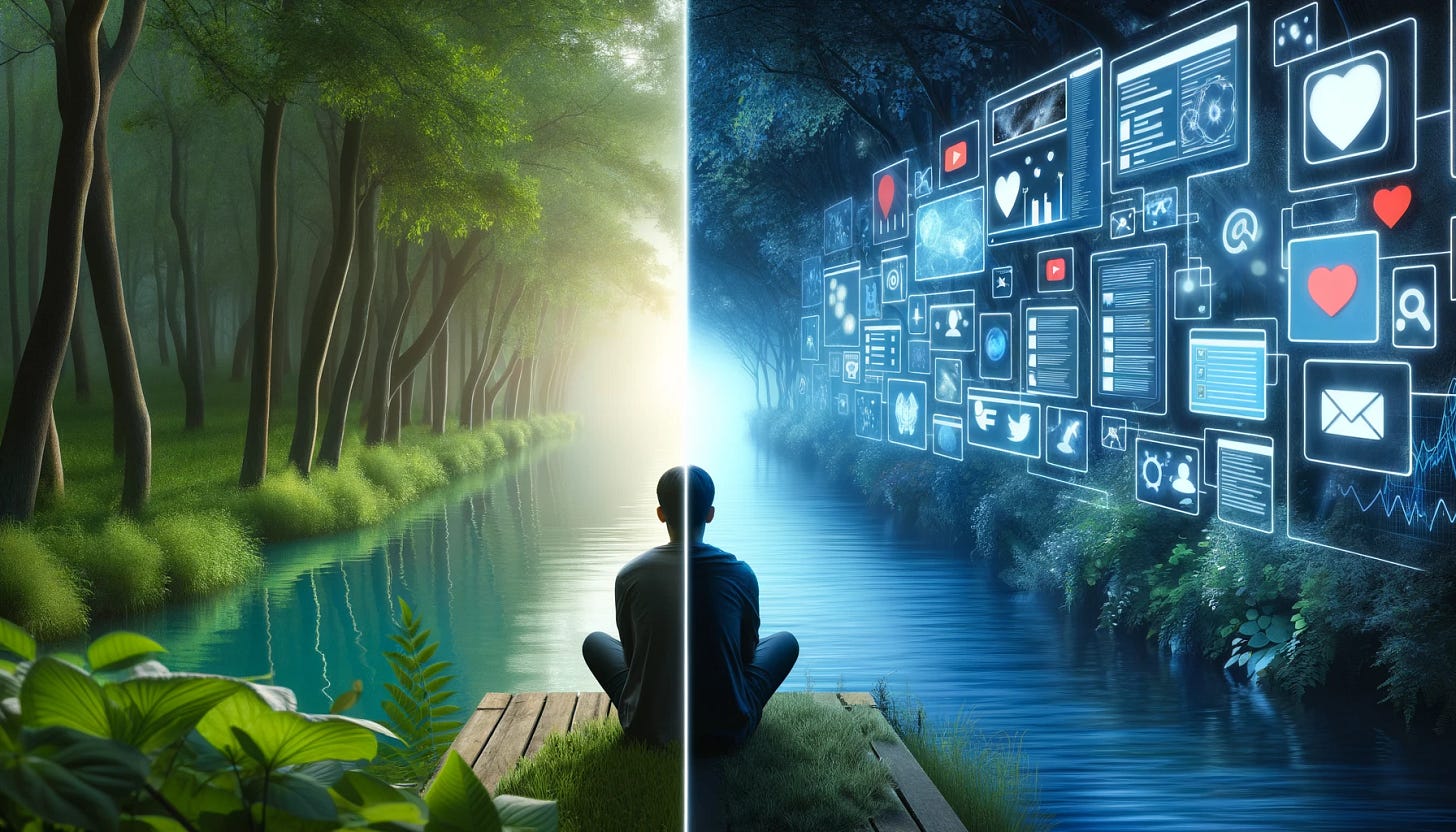Welcome to Beyond the Screen, a space dedicated to exploring the crucial role that digital technologies play in shaping our society and culture, and their impact on human behaviour and wellbeing.
In today's digital age, almost every facet of our daily lives is mediated through our screens. How we entertain ourselves, perform our jobs and connect with others is increasingly conducted through the vast landscape of online platforms.
The screens that permeate our lives serve as our window to the modern world, providing us with a vivid, high-definition outlook on global news, trends and events. With the magic of a smartphone, we're merely a tap or swipe away from complete access to the world’s endless resources and wonders.
Yet, this window, as authentic and compelling as it appears, does not present us with a clear view of reality. As we gaze through our screens, the digital realm smears the lens of our window, leaving us to navigate a world where the boundaries between reality and a crafted illusion have become increasingly blurred.
In this obscured view, our understanding of the world is skewed by algorithms that reinforce our inherent biases and a clickbait-driven media concerned not for what is true or false, but for what best captures our attention.
By showcasing only the most extreme and outlandish comments, stories and events from around the globe, the internet amplifies fear and anxiety as we’re tricked into thinking the world is overrun with evil forces.
Meanwhile, cultural divisions are intensified as we find ourselves immersed in online spaces that distort our view of those who hold opposing beliefs, all the while reinforcing the righteousness of our own.
And just as our screens act as our windows out to the world, they serve too as mirrors reflecting back to us our personal identities and sense of self. Everything from our desires to our political views are profoundly shaped by the content we consume through screens.
The psychoanalyst Carl Jung once asserted that “the world will ask you who you are, and if you do not know, the world will tell you”. In the context of our digital age, this observation gains a whole new dimension: “the screen will ask you who you are, and if you do not know, the screen will tell you”.
The more we dedicate our lives to the online world, the more we allow ourselves to be captured by its curated ideals, letting it mould our aspirations and self-image to its own design.
These mirrors, of course, are not without their own distortions.
Just as our window out to the world is smeared by biases and crafted illusions, the mirror reflecting back to us is clouded by carefully curated highlight reels that showcase only the peak moments of people’s lives while conveniently omitting the struggles, failures and often mundane reality of daily existence.
As a result, our sense of who we ought to be, when absorbed through the screen, becomes anchored to a false projection of reality.
Beyond the Screen is an attempt to shine a light on these distortions that are impairing our perception of the real world.
By developing a deeper understanding of our own human biases and learning to recognise how they are being hijacked by tech companies, we can begin to view the world through a clearer lens and sidestep the traps set by algorithms designed to exploit our basic impulses.
But it is not just through these distortions that our screens are impacting our lives: the digital world has thrust us into an era of limitless possibilities, where we find ourselves navigating through an avalanche of choice every day.
In a single sitting, we can browse through an entire warehouse supply of clothes, plunge into the infinite scroll of ‘content’ that our social media feeds generously offer and swipe through more potential partners than we could ever expect to meet in a lifetime. All this, while undertaking the Herculean task of finding something that’s actually worth watching from our endless supply of streaming services.
On the surface, this boundless access presents itself to us as empowerment and opportunity, allowing us the freedom to choose exactly what we want, when we want it. However, the reality for many often translates into increasing anxiety, crippling indecisiveness and dissatisfaction.
Confronted with such a range of options before us, settling on a single decision and remaining committed to it becomes an impossible challenge. We’re seduced by the illusion that the ultimate selection lies just beyond the next swipe or click and so we keep on browsing in search of that perfect choice we’ve been promised.
But this myth of perfection, of making the perfect choice, robs us of the ability to be satisfied with any final decision that we make. Instead, we’re left to ruminate over what might have been had we opted for an alternative.
And with this avalanche of choice comes a deluge of distraction. The vast array of different inputs competing for our attention can overwhelm our ability to focus on a single task, leading to what psychologists call “decision fatigue”: the more choices we have to make, the more our mental resources are depleted, making it harder to make good decisions or stay focused.
This impact on our attention spans is compounded by the instant access our devices provide to an unlimited stream of information and entertainment, reshaping our understanding of the relationship between effort and reward.
We’ve grown accustomed to a world where the delay between desire and gratification is minimal, leading to a diminished capacity to tolerate frustration and setbacks when working towards long-term goals.
But the reality is that life is hard, and the growing inability amongst young people to handle discomfort and adversity provides the foundations for a mental health crisis when the inevitable difficulties of life come knocking on the door.
Consequently, many are increasingly distancing themselves from the physical world, opting instead for the safety and predictability found within the digital realm.
Why contend with a world of struggle, uncertainty and rejection when you can access an abundance of instant pleasure from the comfort of your own bed, delivered free of charge by the screen.
The allure of these digital pleasures, however, is not restricted to just these disillusioned youths: generations young and old alike are held captive by the twists and pulls of our digital creations.
Despite older citizens having the benefit of a youth free from digital interference, they too find themselves ensnared by the addictive nature of today’s technology, grappling with similar distractions and dependencies as their younger counterparts.
And while an increasing number of people across all age groups are becoming conscious of the grip digital technology has on their lives, breaking free from its compulsive allure remains a challenge that many find themselves unprepared to tackle.
If all of this sounds uncomfortably familiar to you… you’re in the right place.
Beyond the Screen is for anyone that seeks a healthier relationship with the digital technologies that are consuming their lives.
In future posts, we’ll examine the many ways that our devices and online platforms are moulding our habits and behaviours to their own design, and how our perception of the world is being impaired by the screens through which we view it.
Leaning on sources ranging from the wisdom of the ancient world to the leading research and insights of the present, we’ll also consider strategies for how we can reclaim our autonomy and reduce the undue influence that digital technologies exert over our lives.
If we can, at the very least, develop an awareness to the different ways that our devices and online platforms are exploiting our predispositions and eroding what makes us human, we can begin to make more informed choices about how we interact with technology, shifting the balance of control back into our hands and away from the grasp of the machine.




